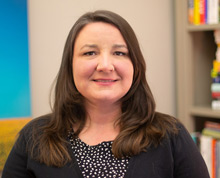
Britte Garrett, LMHC, CCTP
UI EAP, senior behavioral health clinician
Britte is a Senior Behavioral Clinical Specialist with the University of Iowa Employee Assistance Program. She is a Licensed Mental Health Counselor and Certified Clinical Trauma Professional. Prior to EAP, Britte worked as a counselor in private practice, a prison setting, and foster care. She has also provided services to survivors of domestic violence and sexual assault.
As the days get colder and shorter, it’s a good time to do a check-in and take stock of how you are doing and what you need to make it through the winter to maintain or even improve your well-being. Working with a licensed mental health professional is a great way to identify what you need to care for yourself or solve a problem.
The UI Employee Assistance Program (UI EAP) is here to help. We provide up to six free, confidential counseling sessions per year to faculty, staff, post docs, medical residents, and their families. If you are not familiar with counseling, you may be wondering if EAP is the right place for you. There is no reason too small to visit UI EAP.
When should I go to counseling?
You might need to locate some resources or maybe you are struggling with a difficult relationship or situation. Perhaps you have always thought that counseling would be helpful but haven’t had the ability to give it a try. You are unsure of what to do to improve your well-being. These are all reasons to attend counseling.
EAP promotes problem solving and stress resilience through counseling, coaching, and consultation. Most people who come to EAP may be experiencing issues related to work-life balance, relationship concerns, sleep problems, emotional or psychological health, family concerns, or substance abuse.
Counseling is a private place to share information with an objective party without judgment or worry that it will be shared. Speaking something out loud can change the way you view a situation and changing your perspective can have a big impact. Counseling is a space where you can also identify ways to practice healthy coping skills and self-care.
There is no issue too large or too small for EAP. EAP is for any type of assistance. If the issue is large enough that it is outside of the scope of EAP, you are still in the right place as we can work to identify an appropriate resource or referral. Many people come in to “test drive” counseling and see if it is something they feel will be helpful to them, and that is a great use of EAP as well
What happens at an appointment if I attend?
Many people have some concern about what the first session might be like. That is normal. The experience is all about what you feel is most important. The information you share is voluntary. There is no expectation that you divulge your life story or all
the details of traumatic events. It is normal in the counseling process to work to build trust and rapport with your provider before you share a lot. Other times EAP is a place for people to come in, vent about their feelings in the first session and then that feels like enough and they may not return.
The process is guided by you. You are free to reschedule or to never come back. You are free to ask for a different provider. You are free to switch to a totally different topic if you do come back. You are free to give feedback on what is working and what is not working for you in the process. We have multiple clinicians at EAP and provide referrals, so we can help to get you to a person and place that feels right.
Things you should know:
EAP does not diagnose, do formalized assessments, or provide medication. We are here simply as support and source of assistance.
We are voluntary and confidential. We won’t share any information unless we are concerned you are an immediate danger to yourself or others, and if we did have that concern, you would be the first person to know.
We don’t give advice. Counseling is a collaborative process in which two people (more if it’s couples or family counseling) work together to identify different ways to view an issue and different options one can take to address it. Counselors don’t tell you what to do. They work to help you decide what you want to do.
Nothing is off the table. We are trained to provide support for people that have encountered trauma and difficult situations, and our goal is to create a space where you are not concerned about the therapist, but where you can focus on you. So don’t be worried about the content that you bring.
Consider taking some time to check in with yourself. Your well-being matters. Whether the issue is large or small, we are here for you! If you feel EAP might be helpful to you, email eaphelp@uiowa.edu or call 319-335-2085 to set up an appointment at a convenient time and location for you.
This article originally appeared in the liveWELL 2023 Winter Employee Well-Being Newsletter.
